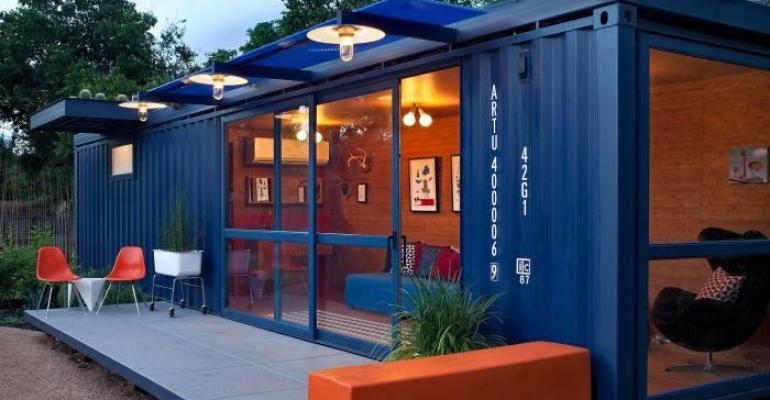Although repurposing used shipping containers has not yet taken off in the United States as quickly as sustainable developers have hoped, another venture has announced it will use this business model to tackle the tightest property markets in New York City.
Two New York City developers, Palladium Management and SG Blocks, have formed a partnership to use repurposed shipping containers to develop multifamily and retail in the city’s borough infill sites. The venture will be funded by Westchester County–based Dillon Hill Capital and is now working on gaining approvals for 24 sites throughout the Big Apple, with one property set to close in the next two months, says SG Blocks CEO Paul Galvin.
David Roth, principal at Palladium, says that, at the end of the day, the venture’s goal is “to show it can be sustainable to live in New York,” he says. “Using the containers, we can cut the tie of construction by half as well as reduce the hard costs, and do it with a sizeable smaller carbon footprint, allowing us to bid successfully where other companies have to factor in more costs,” he says.
The large containers, primarily used for transporting goods across the oceans, are a prime case for green development because it’s generally cheaper for companies to buy new containers than to ship back the empties. In the United States, an estimated 21,000 containers arrive each day, and most do not go back to their original source. Galvin says there are about 22 million of unused containers sitting unused. Film and construction companies are reconfiguring them for temporary living and office uses while on sites, and architects, capitalizing on the sustainability trend, have begun drawing up plans for mid-rise projects using the boxes. The shipping container’s steel construction lends itself well to safe living, and they can be stacked up to 12 containers high.
Galvin says the biggest benefit to using shipping containers in a tight market like New York City is the much-reduced construction time. “While other developers are having to factor in years to market after ground breaks, on a container project, while site work and utilities are being done, we’re at the same time fabricating your building at another location,” he says. “Our carbon fiber footprint is only about 5 percent of traditional construction, and we’re repurposing these containers for higher and better use that will save owners money.”
There are a number of the mid-rise container projects in Europe, including a 170-acre shopping mall in Ukraine, and a 1,000-unit student housing complex in Amsterdam. However, the process of building with shipping containers has had difficulty catching on here. Aside from the flat design of the shipping container’s structure not lending itself to office use, communities often have to alter building standards to accommodate container buildings. “We do anticipate some learning curves when it comes to getting approvals,” Palladium’s Roth says. “Also, there are some lenders who may not understand the project, but I think there’s a significant amount of lenders who have become educated about how modular is delivered.”
One example of how the process can go wrong can be found in Detroit, a city that could certainly use some construction innovation success. Late last year, Three Squared Inc. promised to begin soon the construction of a 20-unit condo development made completely out of shipping containers. The project qualified for a tax credit of more than $600,000, and was ready to accept 93 containers to do the project. However, CEO Leslie Horn says the project was delayed a year because of financing and site acquisition problems, though she wouldn’t comment on why.
However, Horn says they are now moving forward, and this month are finally breaking ground on a two-unit model facility that will show buyers what they can expect in five separate condo projects in the city, mostly in the Corktown neighborhood. “We are working on a total of 70 units in Detroit, with total revenue for all five expected to exceed $14 million,” Horn says.

